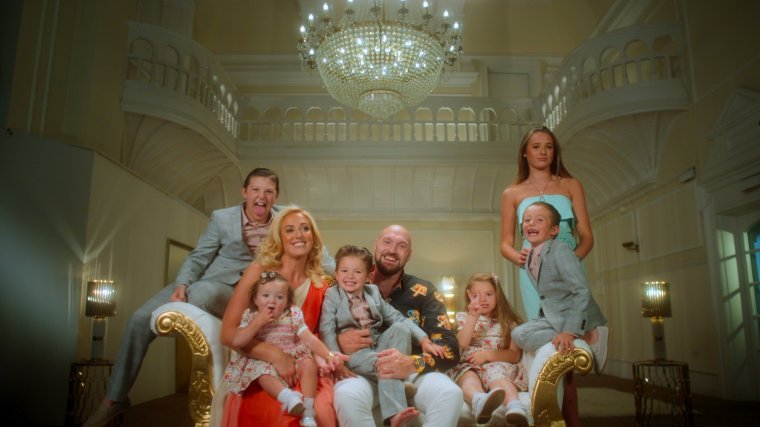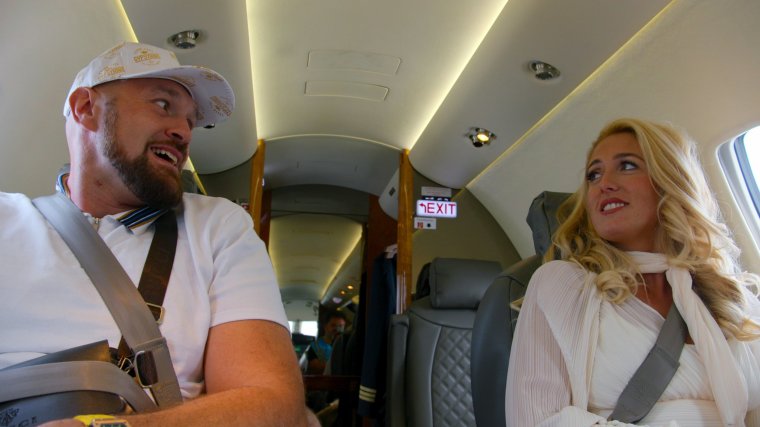On the Morecambe Bay promenade, Tyson Fury is stopped every few minutes by a fan. “Can I have a picture?” they ask the boxer, who invariably obliges, until a bloke taps him on the shoulder and tells him “Joshua could beat you.” “I think anyone on this beach could beat you,” Fury fires back.
There aren’t many celebrities who would allow cameras to capture them calling a fan a “cheeky bastard”, but Fury – unbeaten heavyweight champion of the world, proud “Gypsy King”, father of six (soon to be seven) – is one of a kind.
The scene, more endearing than brash, comes early in Netflix’s new series, At Home with the Furys, a nine-part programme originally commissioned to document the boxer’s retirement, after he knocked out Dillian Whyte in 2022. “It was a good thing for me to focus on rather than going round the bend,” he says, over video call from his Morecambe home.
But that retirement lasted six weeks and before long the series morphed into a real-time account of how Fury’s family dealt with his decision to step back into the ring.
This, thinks Fury, is a chance to see the real him. “People think I’m tall, dark and handsome, super sexy, good looking, great talker,” he starts, sarcastically, before Paris, his heavily pregnant wife of 15 years, interjects to finish his joke: “and now they’ll see that’s not true at all.”

After 15 years of fighting, Fury has become a boxing legend. Millions have watched him knocking seven bells out of his opponents, among them Dereck Chisora, Wladimir Klitschko, and Deontay Wilder, who he KO’d last year, taking home $33.6 (£26.4m). Known for his uninhibited fighting talk (Wilder is “a big dosser”), sense of humour (he once turned up to a press conference dressed as Batman), and post-fight singing, Fury is the greatest showman of boxing.
He’s also outspoken and unabashed, sometimes to his detriment – he has had to apologise in the past for wildly misjudged comments about homosexuality and Jews.
But he has unmatched charisma. In press conferences, on At Home with the Furys, and in person, he seems effortlessly funny, regularly self-deprecating, and, judging by the Netflix series, those who don’t love him at least respect him: that bloke on the promenade was beside himself to meet Fury, even if he did make a dig.
But offering himself up as the subject of a documentary is a risky move. In 2020, the Furys were the subject of another fly-on-the wall docuseries for ITV. It didn’t go well. “After that, we said we’d never do it again,” says Tyson. “It’s not the filming that’s hard, it’s what comes after. We had to move house because everyone knew where we lived. It messed up all of our lives. I’m probably going to have to move again when this launches. Netflix has got about 500 billion viewers. It’s going to be difficult.” It’s hard to know how serious Fury is about selling up… days after our conversation he had a huge “Gypsy King” logo painted onto his drive.
“We’ve gone over the pros and cons of it,” says Paris. “There’ll probably be a lot more people interested in our lives. But people think we live this posh celebrity kind of lifestyle,” says Paris. When we chat, she’s just come back from the nursery run; Tyson has been to the tip. Not exactly glam, but it’s still not a “normal” experience.
“I was absolutely tortured,” he says. “I’ve done 15 book signings, autographs, giving people advice. This Netflix documentary is only going to enhance that.” But the chance to humanise themselves and share their lives without any Instagram gloss outweighs the negatives. How often do we get to see what it’s really like for the families of sportspeople at the top of their game?
The Fury family are the most famous members of the Traveller community in the world, and Tyson has previously spoken out about bias against the group (“call me anything you want, just not late for my dinner,” says Tyson when I ask if he prefers to be called a Traveller or a Gypsy). But today, he rejects any idea he should represent all gypsies. “I represent the human community,” he says.
“Outside of my family, I won’t vouch for anybody because at the end of the day, who can you trust? I just want to represent myself as an individual, or be judged on my actions, rather than trying to be accountable for everybody. I suppose I might be representing the school run community. Or the bald-headed man community.”

In their own words, the Fury house is “chaos”, with their six children – Venezuela, Prince John James, Prince Tyson II, Prince Adonis Amaziah, Valencia and Athena – taking up most of the couple’s time. “I’d struggle with a quiet house,” says Paris. “We always said we wanted a big family. It’s the lifestyle we chose. We’re not structured sort of people; we don’t plan anything, we don’t organise.” “I never sit by myself because I don’t want to be alone,” adds Tyson. “We’re in a fortunate enough position that we can just decide to go to Spain on the day.” He pauses. “I know my patterns of behaviour can be quite erratic.”
The programme doesn’t shy away from showing this. Fury has bipolar disorder, a mental health condition characterised by intense mood swings. “He likes structure, and he doesn’t like to miss his dinner time, but he can only follow a routine or do a nine to five for so long,” says Paris. “All of a sudden, he’ll be like, ‘Right we’re going to Bermuda tomorrow – everybody pack and out the door!’ He’s all or nothing but 18 years later, I’m still here.”
The boxer is very open about his mental health struggles. In 2017 he shared that the first time he retired, back in 2015, Fury spiralled into alcoholism and depression. “It was the worst few years of our lives,” says Paris. The worry this time was that history could repeat itself. “Talking about my struggles helps me a lot, but it also helps millions of other people who are not world heavyweight champions,” says Fury.
“I wouldn’t be able to number how many people have come up to me and told me I saved their life. I go to foreign countries 24 hours away and people have tattoos of me or my quotes. It’s unbelievable.”
Fury leans into this. He regularly buoys his Instagram followers with inspirational videos and spends a lot of time studying the latest research and stats. “Suicide is the biggest killer of men under 35,” he tells me.
“Girls will talk to each other and have a box of chocolates, but it’s no secret that men struggle to talk about their problems – they put on a brave face until they kill themselves or have an explosion in their mind. I used to wake up and ask God why he had made me live another day. Why couldn’t He just let me die? For me the lows are very low, but the highs are very high.”
At times, Fury’s mental health issues make family life difficult. “It’s not something he’s conquered,” says Paris, “but we’ve learned to deal with it. Getting a diagnosis was very helpful for me; it made me realise he’s not just being grumpy and negative towards me and the children. But it does get to you.”
There’s one scene in the series we see Paris particularly hurt. Arriving home from a work trip, Tyson is welcomed home by his wife but ignores her in favour of spending time with his dog. “I felt very unloved,” she says.
But Tyson explains, “if I get something in my mind, I’ve got to do it. I’d been thinking about seeing my dog for the past 12 hours. I have tunnel vision. That’s why I’m so successful. Nobody has the mental capacity or attitude I have towards what I do. I feel sorry for the unfortunate person that’s got to fight me, because I can’t think of anything else but destroying that person.”
Paris laughs. “They say there’s a fine line between insanity and genius.” She looks at her husband, smiling.
“Tyson is very thinly stretched along that line.”
At Home With the Furys is on Netflix from 16 August.


